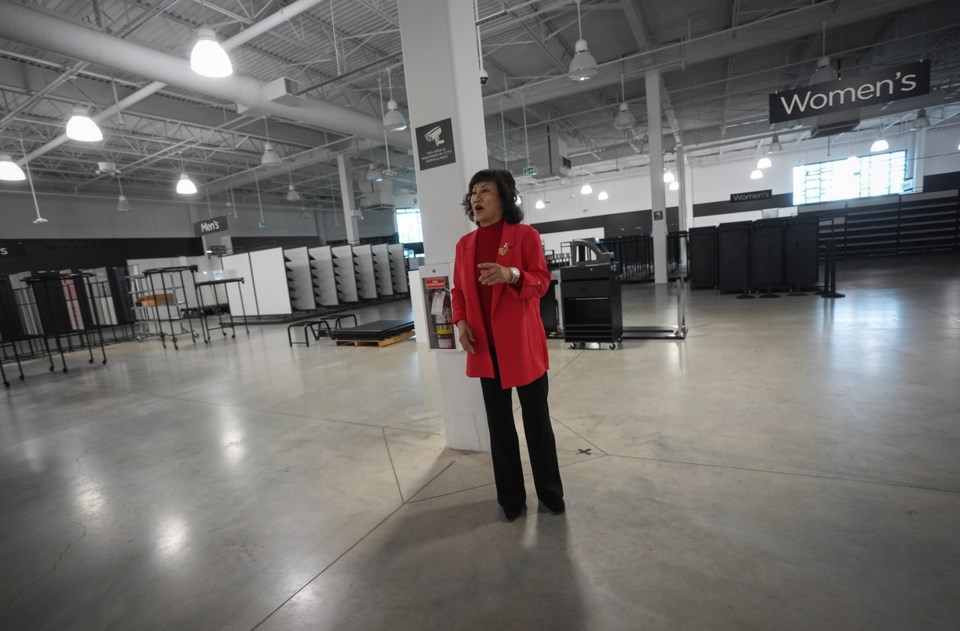TORONTO — A potentially precedent-setting showdown between Hudson's Bay and a group of landlords opposing the retailer's push to sell about two dozen of its leases to a B.C. billionaire got underway in court Thursday.
The battle has been simmering ever since the Bay announced in May that it had selected Ruby Liu to buy 28 of its leases.
Three leases in malls she owns were already transferred to Liu, but a who's who of Canadian landlords are fighting the sale of 25 more for about $69.1 million.
The group, including Cadillac Fairview, Oxford Properties and Ivanhoé Cambridge, don't want Liu to be able to make the purchase because they say the new department store she wants to launch will fail because of her inexperience and insufficient business plan.
Bay lawyer Maria Konyukhova said in court Thursday the case's outcome "will have precedential value" for future lease sales.
At issue is a section of the Companies' Creditors Arrangement Act, a law under which companies, including the Bay, file for creditor protection when they are unable to cope with their debt.
Section 11.3 allows companies to ask the court to assign leases to a potential tenant against the objections of landlords.
If Judge Peter Osborne sides with the retailer, the move could recoup up to $50 million for the defunct department store's most senior lenders.
In deciding whether to make the assignment, the court has to consider three things.
The first is whether the sale has the support of the monitor, a court-appointed, independent third party which regularly reviews the Bay’s creditor protection.
The monitor in the Bay’s case, Alvarez & Marsal, has objected to Liu obtaining the leases. Yet the retailer argues that conclusion “should be given little, if any, weight” because the Liu deal is “the last path to realizing any value for the company’s 98 leases.”
The Bay ran a “robust” sales process to find buyers for leases. A handful were sold to YM Inc., the owner of mall brands including West49, and one to a landlord, but no other deal had a higher chance of completion than Liu’s, Konyukhova told the court.
The second and third aspects the court has to consider under section 11.3 are whether Liu will be able to meet lease obligations and whether her business is an “appropriate” tenant.
The landlords have argued the department store Liu envisions won’t meet the terms of the leases because she wants to use the properties for uses outside the contract. They point to media statements and an early business plan she filed that talked about running a retailer stuffed with dining, entertainment and recreation experiences.
Konyukhova said Thursday such uses aren’t part of her latest business plan and Liu will take the leases “as is.”
Landlords have also taken issue with Liu's timelines and budget. She wants to operate three tiers of store — ranging from flagship to standard locations — and will pour $120 million into renovations. Under her plan some of the stores will open within six months of obtaining leases, but if landlords aren't co-operative, Konyukhova said they'll take longer.
Landlords say the Bay left properties it used in such disrepair that necessary renovations require millions more in funding and significant additional time than Liu allocated for
The repair costs landlords have tallied up are "inflated," Bay lawyer Sinziana Hennig said Thursday. She argued there is little proof Liu will have to spend “vastly more” than she has budgeted and pointed out the Bay was allowed to keep the leases without making the repairs.
Jeremy Opolsky, a lawyer for Cadillac Fairview, said his client didn’t kick the Bay out for failing to do repairs covered by leases because it had lent the retailer millions and thus, didn’t want to see Canada’s oldest company crumble.
By signing a contract for the leases, he argued Liu has committed to following them to a T, not following them with the same lack of rigour the Bay did.
As he spoke, Liu sat in the courtroom gallery along with a posse of almost 20 staff and supporters. Her entourage was so large that many members were sent to an overflow room. The group was clad in red T-shirts bearing a diamond logo and "Ruby Liu" — the name of the department store she wants to launch.
The proceedings they watched kicked off with Konyukhova saying the landlords' arguments are “misguided but totally logical” when you take into account how much they will gain, if the deal fails.
If Liu doesn't get to buy the leases, landlords will get their properties back. They will be able to hike rent prices from the low levels the Bay paid, offer shorter leases than the multi-decade ones the Bay had and even redevelop properties for other uses.
“Why did the landlords allow the properties to fall into disrepair? I submit it’s because they knew this was coming and they wanted to get their stores back for nothing," said Jeremy Dacks, a lawyer for Pathlight Capital, a Bay lender that could receive cash if the Liu deal proceeds.
Unfortunately for the landlords, a well-capitalized bidder emerged instead, making the landlords' decision not to bid on their own leases a "high-stakes gamble," Dacks said.
The landlords have been so vehement in their opposition because "they have a different view of how their space should be used" but that shouldn't stop Liu from getting the leases, her lawyer Graham Phoenix added.
Konyukhova agreed and said Liu's prospective tenancy represents "a fresh slate."
Liu not only has zero debt, unlike the Bay, but has significant capital and can easily get more, the lawyer maintained.
She has also committed to paying a year of rent upfront, which was something the Bay never provided, and she's not planning to get into the e-commerce business the Bay had trouble garnering success with.
This report by The Canadian Press was first published Aug. 28, 2025.
Tara Deschamps, The Canadian Press



